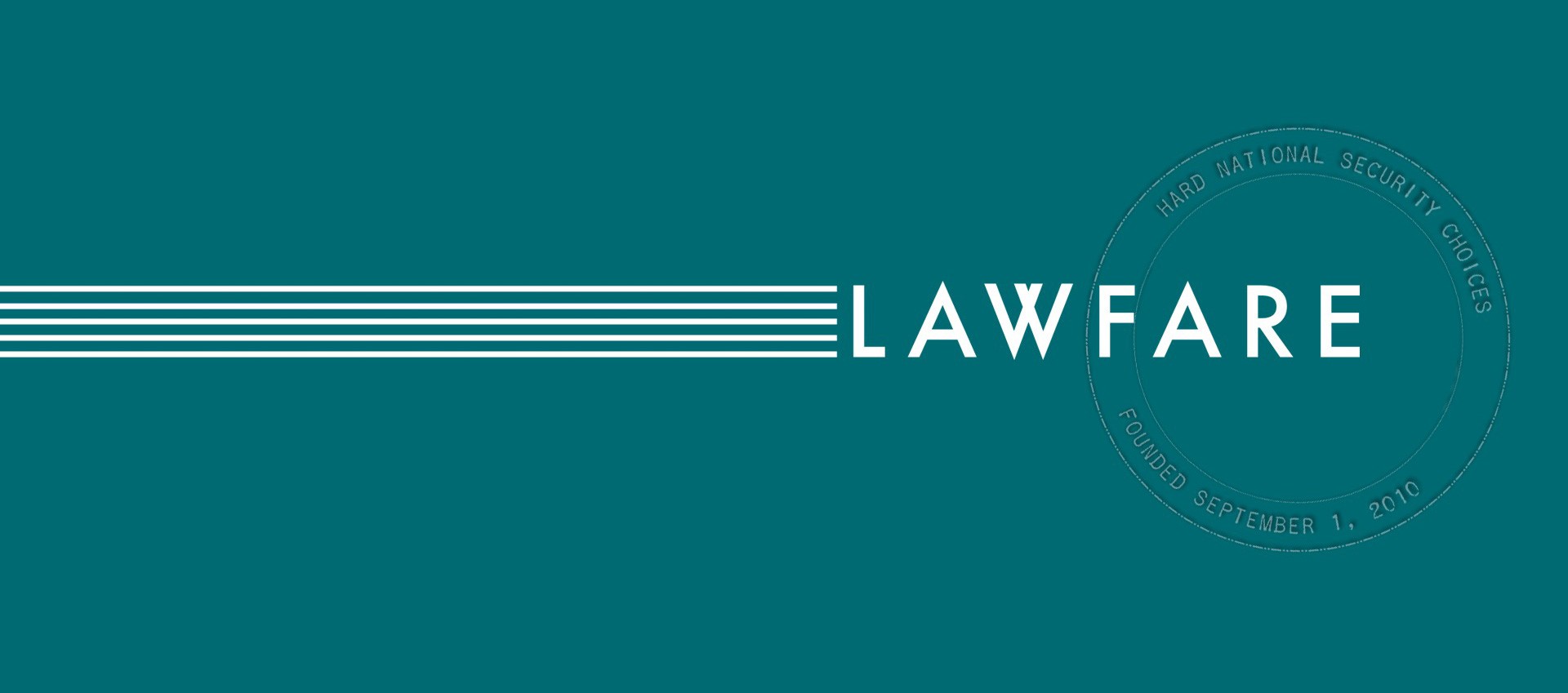The Week That Was: All of Lawfare in One Post

Published by The Lawfare Institute
in Cooperation With

The Lawfare team provided an initial analysis of the indictment of former President Donald Trump and 18 co-defendants for alleged interference in Georgia's 2020 election.
Anna Bower explained the story of alleged electoral fraud in Coffee County, Georgia that is featured prominently in the Aug. 14 indictment against Donald Trump and 18 codefendants for their alleged attempts to overturn the results of the 2020 presidential election in the state.
On the Lawfare Podcast, Benjamin Wittes sat down with Bower to discuss her recent Lawfare article, “What the Heck Happened in Coffee County Georgia,” why individuals associated with the Trump campaign became so interested in Coffee County, and how a team ended up taking the county’s election system data in broad daylight:
Anna Hickey shared a Lawfare Live with Wittes, Bower, Scott R. Anderson, and Quinta Jurecic in which they unpacked the Fulton County indictment against Trump. They discussed Bower’s experience in the courtroom, the different statutes included in the indictment, and answered questions from Lawfare’s material supporters:
On the Lawfare Podcast, Wittes sat down with Bower, Anderson, and Jurecic for a discussion of the Fulton County indictment against Trump and others:
Hickey also shared a new page, “Docket Watch: Trump Prosecuted in Fulton County.” The page tracks primary source documents or other materials related to the indictment of former President Donald Trump and 18 others for alleged interference in Georgia’s 2020 election.
Hyemin Han shared the Fulton County indictment against Trump and 18 co-defendants for their alleged efforts in Georgia to overturn the results of the 2020 presidential election.
Jack Goldsmith analyzed claims that prosecuting former President Donald Trump for election fraud is necessary to safeguard our democracy in the context of his Aug. 8 argument in the New York Times to the contrary.
Wittes and Saraphin Dhanani discussed the four main arguments John Lauro, Trump’s defense counsel, will likely make to defend the former president in his D.C. case: Trump believed in good faith that he had won the election, he was exercising his First Amendment rights, he was acting on the advice of counsel, and his status as a sitting president granted him immunity from prosecution.
Jason D’Andrea and Kai Wiggins discussed 18 U.S.C. § 241 (or the conspiracy against rights statute)—one of the four statutes a D.C. grand jury charged under Trump in his alleged attempt to undermine the results of the 2020 election. They discussed if an individual can violate § 241 without committing an act of violence, as well as what and whose rights are protected under § 241.
Roger Parloff explained why jurors in former President Trump’s Jan. 6 trial in Washington, D.C. will likely not be swayed by his argument that he sincerely believed his claims of election fraud were true and thus was not acting in bad faith.
On the Lawfare Podcast, Katherine Pompilio sat down with Parloff to discuss Trump’s vow to move his trial for allegedly conspiring to overturn the results of the 2020 election out of DC. They covered other venue transfer motions by Jan. 6 defendants, the Justice Department’s response, and why if Trump files a motion to transfer venue in his Jan. 6 case, it is likely “dead on arrival":
Dhanani reported on the Aug. 11 hearing on the parameters of the government’s motion for a protective order in the case against former President Donald Trump for his alleged attempt to overturn the results of the 2020 election.
On Rational Security, Anderson, Jurecic, and Rozenshtein sat down to discuss the week’s big national security news stories, including Fulton County District Attorney Fani Willis’s indictment of Donald Trump and 18 co-conspirators for attempting to interfere with Georgia’s 2020 election results, Attorney General Merrick Garland’s appointment of Delaware U.S. Attorney David Weiss as a special counsel to investigate Hunter Biden, President Biden’s executive order installing controls on outbound U.S. investments, and more:
Pompilio shared a notice of removal filed by Mark Meadows, Trump’s former chief of staff, asserting that the alleged illegal conduct specified in the Fulton County indictment against Trump and 18 others was simply “part of his service as Chief of Staff.”
Gia Kokotakis shared a criminal complaint charging a Texas woman for allegedly calling Judge Tanya S. Chutkan’s chambers on Aug. 5 and leaving a voicemail containing racial epithets in which she threatened her life.
Adam Unikowsky discussed Judge Aileen Cannon’s recent decision to deny the Justice Department’s motion to file under seal and request that Nauta file a supplemental briefing in the case against Trump, Waltine Nauta, and Carlos De Oliveira in the Mar-a-Lago classified documents case.
Tyler McBrien shared a decision by New York Supreme Court Justice Juan Merchan declining to recuse himself from the New York state case against Donald Trump regarding payments made to adult actress Stormy Daniels.
On the Lawfare Podcast, Jurecic sat down with Molly Reynolds to discuss her new Brookings report on congressional oversight in the post-Trump era. They discussed the patterns Reynolds found in oversight from the 116th Congress through today, as well as what the Jan. 6 committee’s investigation does and doesn’t tell us about congressional investigations going forward:
In this week’s installment of Lawfare’s Foreign Policy Essay series, Sean Ziegler wrote that although cluster munitions use carries significant risks, their effectiveness in an artillery-driven war, potential to alter the conflict’s status quo, and compatibility with existing Ukrainian launchers justifies the Biden administration’s decision to send them to Ukraine.
Shannon Green, John Moulton, and Christine Parthemore discussed the history of the Chemical Weapons Convention and the compliance and nonproliferation challenges that remain after the recent elimination of the U.S. chemical weapons stockpile.
Han reviewed the 2023 film “Oppenheimer” and its meaning in the context of shifting American national security priorities and technological innovation.
McBrien shared a Montana state court ruling in the case of Held v. Montana in favor of the plaintiffs–16 young people who sued the state for violating their constitutional right to a clean environment.
And on Chatter, David Preiss sat down with Calder Walton to discuss his path to researching and writing within the intelligence history subfield, the story of the Mitrokhin archive, Russian disinformation campaigns in historical context, popular myths about the master recruits of the KGB, and more:
And that was the week that was.




